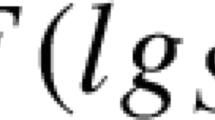Abstract
We give Scott sentences for certain computable groups, and we use index set calculations as a way of checking that our Scott sentences are as simple as possible. We consider finitely generated groups and torsion-free abelian groups of finite rank. For both kinds of groups, the computable ones all have computable \(\varSigma _3\) Scott sentences. Sometimes we can do better. In fact, the computable finitely generated groups that we have studied all have Scott sentences that are “computable d-\(\varSigma _2\)” (the conjunction of a computable \(\varSigma _2\) sentence and a computable \(\varPi _2\) sentence). In [9], this was shown for the finitely generated free groups. Here we show it for all finitely generated abelian groups, and for the infinite dihedral group. Among the computable torsion-free abelian groups of finite rank, we focus on those of rank 1. These are exactly the additive subgroups of \(\mathbb {Q}\). We show that for some of these groups, the computable \(\varSigma _3\) Scott sentence is best possible, while for others, there is a computable d-\(\varSigma _2\) Scott sentence.
Similar content being viewed by others
References
Alvir, R., Knight, J.F., McCoy, C.: Complexity of Scott sentences
Ash, C.J., Knight, J.F.: Computable Structures and the Hyperarithmetical Hierarchy. Elsevier, Amsterdam (2000)
Beaumont, R.A., Zuckerman, H.S.: A characterization of the subgroups of the additive rationals. Pacific Journal of Mathematics 1, 169–177 (1951)
Benois, M.: Parties rationnells du group libre. C. R. Acad. Sci. Paris Ser. A-B 269, 1188–1190 (1969)
Calvert, W., Cummins, D., Knight, J.F., Miller, S.: Comparing classes of finite structures. Algebra Log. 43, 374–392 (2004)
Calvert, W.: The isomorphism problem for classes of computable fields. Arch. Math. Log. 75, 327–336 (2004)
Calvert, W.: The isomorphism problem for computable abelian p-groups of bounded length. J. Symb. Log. 70, 331–345 (2005)
Calvert, W., Harizanov, V.S., Knight, J.F., Miller, S.: Index sets of computable structures. Algebra Log. 45, 306–315 (2006)
Carson, J., Harizanov, V., Knight, J.F., Lange, K., McCoy, C., Morozov, A., Quinn, S., Safranski, C., Wallbaum, J.: Describing free groups. Trans. Am. Math. Soc. 364, 5715–5728 (2012)
Csima, B.F., Montalbán, A., Shore, R.A.: Boolean algebras, Tarski invariants, and index sets. Notre Dame J. Form. Log. 47, 1–23 (2006)
Dobritsa, V.P.: Complexity of the index set of a constructive model. Algebra Log. 22, 269–276 (1983)
Goncharov, S.S., Knight, J.F., Harizanov, V., Shore, R.A.: \(\varPi ^1_1\) relations and paths through \(\cal{O}\). J. Symb. Log. 69, 585–611 (2004)
Goncharov, S.S., Knight, J.F.: Computable structure and non-structure theorems. Algebra Log. 41, 351–373 (2002)
Harrison-Trainor, M., Ho, M-C.: On optimal Scott sentences of finitely generated algebraic structures (pre-print)
Ho, M.: Describing groups. Proc. Am. Math. Soc 145, 2223–2239 (2017)
Kapovich, I., Schupp, P.E.: Genericity, the Arzhantseva–Ol’shanskii method, and the isomorphism problem for one-relator groups. Math. Ann. 331, 1–19 (2005)
Kharlampovich, O., Myasnikov, A.: Elementary theory of free non-abelian groups. J. Algebra 302, 451–552 (2006)
Keisler, H.J.: Model Theory for Infinitary Logic. North-Holland, Amsterdam (1971)
Knight, J.F., McCoy, C.: Index sets and Scott sentences. Arch. Math. Log. 53, 519–524 (2014)
Lempp, S., Slaman, T.A.: The complexity of the index sets of the \(\aleph _0\)-categorical theories and of Ehrenfeucht theories. Adv. Log. Contemp. Math. 425, 43–47 (2007)
Lyndon, R.C., Schupp, P.E.: Combinatorial Group Theory. Springer, Berlin (1977)
McCoy, C., Wallbaum, J.: Describing free groups, Part II: \(\varPi ^0_4\) hardness and no \(\varSigma ^0_2\) basis. Trans. of the Amer. Math. Soc. 364, 5729–5734 (2012)
Rabin, M.O.: Computable algebra, general theory, and theory of computable fields. Trans. Am. Math. Soc. 95, 341–360 (1960)
Raz, A.: Index sets of some computable group. Ssenior Thesis, Wellesley College (2014)
Sela, Z.: Series of six papers appearing. In: Publications Mathématiques Institute des Hautes Études Scientiques, Israel Journal of Mathematics and Geometric and Functional Analysis
Scott, D.: Logic with denumerably long formulas and finite strings of quantifiers. In: Addison, J., Henkin, L., Tarski, A. (eds.) The Theory of Models, pp. 329–341. North-Holland, Amsterdam (1965)
Sipser, M.: Introduction to the Theory of Computation. PWS Publishing Company, Boston (1997)
Soare, R.I.: Computability Theory and Applications: The Art of Classical Computability. Computability in Europe Series. Springer, Berlin, Heidelberg (2016)
Szmielew, W.: Elementary properties of abelian groups. Fund. Math. 41, 203–271 (1955)
White, W.: Characterizations for Computable Structures, PhD dissertation, Cornell University, (2000)
White, W.: On the complexity of categoricity in computable structures. Math. Log. Q. 49, 603–614 (2003)
Author information
Authors and Affiliations
Corresponding author
Additional information
Since this paper was written (in 2013), there have been further results obtained. Ho [15] showed that the computable finitely generated groups in several further classes also have computable d-\(\varSigma _2\) Scott sentences. He also showed that for a finitely generated computable group G, if there is a computable \(\varSigma _2\) formula that defines a non-empty set of generating tuples, then there is a computable d-\(\varSigma _2\) Scott sentence. Still more recently, Harrison-Trainor and Ho [14] characterized the finitely generated groups that have a d-\(\varSigma _2\) Scott sentence as those that do not have a generating tuple \(\bar{a}\) and a further tuple \(\bar{b}\), not a generating tuple, such that all existential formulas true of \(\bar{b}\) are true of \(\bar{a}\). They gave an example of a computable finitely generated group that does not have a d-\(\varSigma _2\) Scott sentence. Alvir et al. [1] gave a different characterization. For a finitely generated group G, there is a d-\(\varSigma _2\) Scott sentence if and only if for every (some) generating tuple \(\bar{a}\), the orbit of \(\bar{a}\) is defined by a \(\varPi _1\) formula. For a computable finitely generated group, there is a computable d-\(\varSigma _2\) Scott sentence if and only if for every (some) generating tuple \(\bar{a}\), the orbit of \(\bar{a}\) is defined by a computable \(\varPi _1\) formula.
Rights and permissions
About this article
Cite this article
Knight, J.F., Saraph, V. Scott sentences for certain groups. Arch. Math. Logic 57, 453–472 (2018). https://doi.org/10.1007/s00153-017-0578-z
Received:
Accepted:
Published:
Issue Date:
DOI: https://doi.org/10.1007/s00153-017-0578-z



